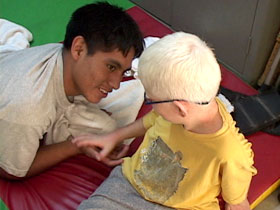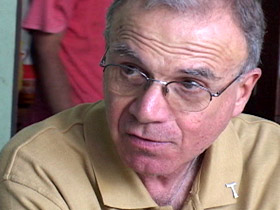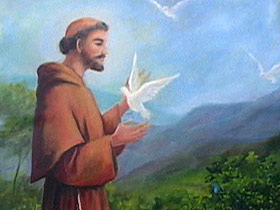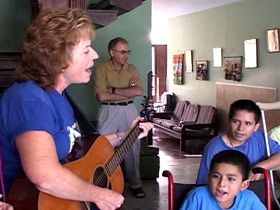Peru Doctor
Tony Lazzara was a successful doctor living a comfortable life in the United States, but he left it all behind so he could follow the example of St. Francis of Assisi and help poor, handicapped children in Peru.
BOB ABERNETHY, anchor: Now, a remarkable story about a once prosperous doctor who wanted to live like St. Francis of Assisi, helping the poor. And not just any poor: poor children with big problems. Lucky Severson reports from Peru.
Dr. TONY LAZZARA: This is Victor. He's a happy kid. He's bright, he's curious. He's the soul of the house, really. He's just wonderful.
LUCKY SEVERSON: Six-year-old Victor was born with only one leg and no arms. Doctors in Tampa, Florida built a second leg so he's able to get around. But, Victor's personality is so big it's easy to forget his handicap.
Dr. LAZZARA: You know what he just said? "I'm the king of the house."
SEVERSON: The house is actually a clinic, although it feels more like a home. It's near Lima, Peru and it's only for sick kids whose parents are too poor to pay for medical care. It wouldn't exist if not for Dr. Tony Lazzara.

Dr. LAZZARA: When I came here, I came here solely as a physician to treat and to help, you know, the sick. But now it's more -- I'm a father figure, or at my age, a grandfather figure, however you want to put it.
SEVERSON: His children range from toddlers to young adults. They can stay here as long as Dr. Lazzara can help them. Most are very sick.
(to Dr. Lazzara): The little girl here in the pink hat?
Dr. LAZZARA: She has leukemia. Oh, they're giving him an injection. Oh, that's why he's crying.
SEVERSON: He was born with spina bifida -- in other words his spine was open.The doctor, his nurses and volunteers were treating 52 kids while we were there. The clinic is meant to handle 40.
Dr. LAZZARA: See, she's trying to teach him equilibrium. Notice how his teeth are broken, 'cause he falls. He's really a sweet kid though, you know. Oh yeah, he's a good kid.
SEVERSON: This little girl, Neida, age 14, has a curved spine that's compressing her heart and lungs. She needs very expensive surgery that can only happen in someplace like the U.S. Dr. Lazzara has found a surgeon in Tampa who has volunteered, but he can't find a hospital.

Dr. LAZZARA: The physicians take these children on, you know. They say "Don't worry about our fees, we won't charge anything." It's the hospitals that have to make the money and they're a business. In some ways I understand, but still -- what do I do with the child that's slowly asphyxiating, that's slowly dying?
SEVERSON: In this clinic, the patients who can, help each other.
THERESA STOWERS (Nurse): That's what really struck me, it feels as if it's a big family.
SEVERSON: Theresa Stowers is a registered nurse who specialized in geriatric medicine in Europe for almost 30 years, until, she says, God sent her on a mission here.
Ms. STOWERS: But, you know, I was scared of kids before, but now I love them, really love them.
Dr. LAZZARA: You know, they're brave kids. They're really good kids.
SEVERSON: Dr. Lazzara shares breakfast, lunch and dinner with his patients, and then supervises while they do the dishes and clean the house, which is usually spotless. For those who can't attend school, he provides tutors.
Dr. LAZZARA: It's not just and it shouldn't just be a medical facility. I mean, it's a situation in which we're trying to train the children. We're trying to train them to face life, when they leave here, you know, so they can lead a dignified life. That's what we're trying to do.
SEVERSON: Before he came to Peru almost 25 years ago, Tony Lazzara was a professor of pediatrics at Emory University, and a leading researcher on brain surgery in premature infants. He also supervised neonatal wards in two Atlanta hospitals.

He was living on easy street.
Dr. LAZZARA: I mean, I had a nice little sports car and I had a nice condominium with fancy furniture, but it didn't mean anything. It was there, but it didn't really mean anything.
SEVERSON: He gave up manicured lawns for the dusty streets of Peru's slums.
Dr. LAZZARA: Half of Peruvians live like these people, you know, in shacks with dirt floors.
SEVERSON: Lazzara grew up a Catholic but says he left the Church completely shortly after graduating from medical school. Then a series of events led him back to the Church.
Dr. LAZZARA: We had a very sick child in the neonatal intensive care unit and I really wanted this kid to make it and I said, "Okay, God, this kid lives and I start going to mass. This kid lives and I go to mass." Okay, the kid lived, so I started going to mass -- not confession, not the sacraments, but mass.
SEVERSON: Then he made another promise to God. A lifesaving catheter needed to be inserted into a tiny premature baby, something no one could manage.
Dr. LAZZARA: I said, "Okay God, he gets it and I go to confession. Damnit, he got it and it went right in, so I started going. So, I went to confession.
SEVERSON: The 40-year-old doctor started searching for something to complete his life, a place in the world where he could serve. He ended up in Peru with his doctors' bag and some books on Spanish.
It's never been easy here for Dr. Lazzara. Nine years after he arrived, he was told he needed to get a Peruvian medical degree or go to prison. So, he very reluctantly returned to the U.S. where he worked with indigent patients in southern Florida. But he knew he wasn't doing what God meant for him to do. Then a friend took his medical credentials to one of Peru's top medical schools, which immediately granted him a degree. Even his ailing, aging mother told him to get on a plane and back to where he belonged.

Lazzara purchased a house to serve as a clinic, in a safe neighborhood outside Lima and moved into the servants' quarters upstairs, a tiny room with a tiny window.
The walls of the house are covered with pictures of Christ and St. Francis of Assisi, the rich man who gave up everything to help the poor. St. Francis is Lazzara's hero.
(to Dr. Lazzara): He's very important in your life, St. Francis of Assisi?
Dr. LAZZARA: Oh yeah, he's the reason I'm here.
SEVERSON: Frank Megna has known the doctor's family back in Florida for almost 40 years. To celebrate is 75th birthday, he came here to volunteer for two months.
FRANK MEGNA: No, he doesn't talk openly about his religion -- he says he has to go to mass every night just to keep going and thanking God and asking God to keep him going. That's his thing.
SEVERSON (to Dr. Lazzara): How do you justify this kind of thing happening to these little kids?
Dr. LAZZARA: You mean why are these children suffering? Well, I do know that suffering makes us more dependent on God. It makes us more dependent on each other. Suffering engenders charity, makes us love one another more. These children are in some ways -- are redeeming me.

SEVERSON: Children like Victor, who feeds himself with his toes, and doesn't complain.
Dr. LAZZARA: He brings a lot of joy to the house. A lot of joy.
SEVERSON: The doctor does a little bit of everything, including making the daily run for buckets of donated milk.
A world away, back home, his three brothers -- a heart surgeon, a federal judge and a successful businessman started a foundation called "Villa La Paz" -- every dollar donated is spent on the kids. The brothers themselves pay for Dr. Lazzara's living expenses, but no one can accuse him of living grand.
Ms. STOWERS: I told him I need to clean his shoes and shine them up a little bit. I think he likes to be like St. Francis of Assisi.
Dr. LAZZARA: One tries to help the poor. One sees Christ in the poor. One considers the poor our brother and sister. That's Christianity really -- that is what -- the gospel is full of that. Christ was always with the poor and with the sinners and he healed, he had compassion.
SEVERSON (to Dr. Lazzara): What would be happiness for you, in this context?
Dr. LAZZARA: In this context, what would be happiness? To be able to do this forever. Not to have to worry about mortality and things such as that, what's going to happen to the house --when something happens -- 'cause inevitably something will happen to me.
SEVERSON: Dr. Lazzara is 63 and starting to worry about the future -- about who will take care of the clinic, the kids -- who will take care of Victor?
For RELIGION & ETHICS NEWSWEEKLY, I'm Lucky Severson near Lima, Peru.
Tony Lazzara was a successful doctor living a comfortable life in the United States, but he left it all behind so he could follow the example of St. Francis of Assisi and help poor, handicapped children in Peru.